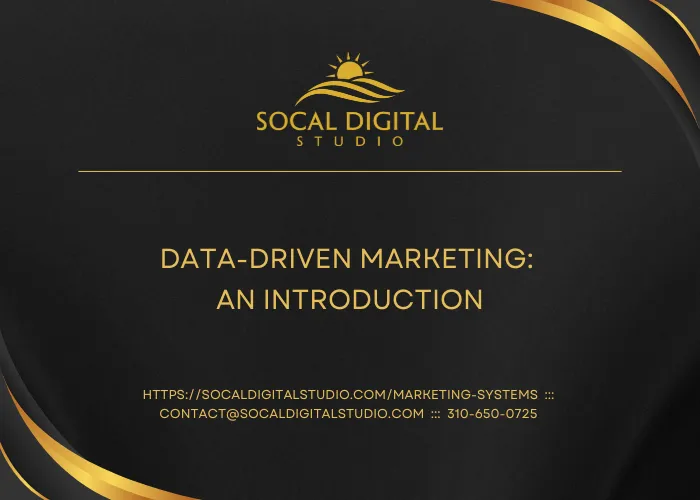PROPELLING SUCCESSFUL BUSINESSES
Actionable Best Practices

Data-Driven Marketing: An Introduction
“Information is the oil of the 21st century, and analytics is the combustion engine.” - Peter Sondergaard
Introduction
In today's digital age, marketing strategies have evolved significantly. One of the most impactful changes is the rise of data-driven marketing. This approach leverages data collected from various sources to guide marketing decisions, ensuring campaigns are more targeted, effective, and efficient. For small business owners, understanding and implementing data-driven marketing can be a game-changer.

What is Data-Driven Marketing?
Data-driven marketing refers to the strategies and tactics businesses use based on data analysis and insights to enhance their marketing efforts. Instead of relying on intuition or assumptions, marketers use actual data to understand customer behaviors, preferences, and trends. This data can come from various sources such as website analytics, social media, customer surveys, and sales records.
Key Terms Defined
Analytics: The systematic computational analysis of data. In marketing, this often refers to tracking and interpreting website traffic, social media interactions, and other customer behavior metrics.
Big Data: Extremely large data sets that can be analyzed computationally to reveal patterns, trends, and associations, especially relating to human behavior and interactions.
Customer Segmentation: Dividing a customer base into groups of individuals that are similar in specific ways relevant to marketing, such as age, gender, interests, or spending habits.
Personalization: Tailoring a marketing message or experience to an individual customer based on their data.
Issues Addressed by Data-Driven Marketing
Data-driven marketing addresses several critical issues that traditional marketing approaches often face:
Inefficiency: Traditional marketing can be broad and unfocused, leading to wasted resources. Data-driven marketing targets specific demographics and behaviors, ensuring that marketing efforts are more likely to reach the right audience.
Lack of Measurable Results: Without data, it's challenging to measure the success of a marketing campaign. Data-driven marketing provides clear metrics and KPIs (Key Performance Indicators), allowing businesses to track and adjust their strategies effectively.
Customer Irrelevance: Generic marketing messages can often miss the mark. Data-driven marketing enables personalization, making interactions more relevant and engaging for customers.
Pros of Data-Driven Marketing
Increased ROI: By targeting the right audience with the right message, businesses can maximize their return on investment. For instance, a study by Invesp found that data-driven personalization can increase marketing ROI by up to 20%.
Enhanced Customer Insights: Understanding customer behavior and preferences allows businesses to develop more effective marketing strategies. For example, Amazon uses data-driven marketing to recommend products to users based on their browsing history and past purchases, significantly increasing sales.
Better Customer Experience: Personalization leads to a better customer experience. When customers feel understood and valued, they are more likely to remain loyal. A Salesforce report indicates that 84% of customers say being treated like a person, not a number, is very important to winning their business.
Improved Decision Making: Data provides a factual basis for decision-making, reducing the reliance on gut feelings. This can lead to more successful marketing strategies and business decisions.
Cons of Data-Driven Marketing
Privacy Concerns: Collecting and using customer data raises privacy issues. Businesses must ensure they comply with data protection regulations like GDPR (General Data Protection Regulation) in Europe or CCPA (California Consumer Privacy Act) in the United States.
Data Management Challenges: Handling large volumes of data can be complex and require significant resources. Small businesses may struggle with the costs and expertise needed for effective data management.
Risk of Data Overload: Too much data can be overwhelming and lead to analysis paralysis, where decision-making is delayed because there is too much information to process.
Dependency on Data Quality: The effectiveness of data-driven marketing depends on the quality of the data collected. Inaccurate or incomplete data can lead to misguided strategies.
Case Studies and Examples
Netflix: One of the most well-known examples of data-driven marketing is Netflix. By analyzing viewing habits and preferences, Netflix recommends shows and movies to its users, leading to increased viewer satisfaction and retention. This personalized approach has been a significant factor in its global success.
Starbucks: Starbucks uses data-driven marketing to enhance customer loyalty. By analyzing purchase history and preferences through their rewards program, Starbucks can send personalized offers and recommendations to customers, driving repeat business.
Coca-Cola: Coca-Cola leverages big data for personalized marketing campaigns. For example, their "Share a Coke" campaign used data to print popular names on bottles, significantly increasing sales and customer engagement.
How to Implement Data-Driven Marketing
Collect Data: Use tools like Google Analytics, social media insights, and customer feedback forms to gather data on your customers.
Analyze Data: Employ analytics software to interpret the data and identify patterns and trends.
Segment Your Audience: Divide your customer base into segments based on demographics, behavior, and preferences.
Personalize Marketing Efforts: Use the insights gained to tailor your marketing messages and campaigns to each segment.
Measure and Adjust: Continuously monitor the performance of your marketing efforts and adjust your strategies based on the data.
Conclusion
Data-driven marketing is a powerful approach that can transform how small businesses operate and compete in today's market. By leveraging data to guide decisions, businesses can increase efficiency, enhance customer experiences, and achieve better results. However, it's essential to balance the benefits with potential challenges like privacy concerns and data management complexities. With careful implementation and a commitment to data quality, small businesses can harness the power of data-driven marketing to drive growth and success.
References
Invesp: The State of Data-Driven Marketing
Salesforce: State of the Connected Customer Report
Netflix: How Netflix uses data to drive success
Starbucks: Data-driven marketing in Starbucks
Coca-Cola: Coca-Cola's Big Data Strategy
We Help Companies Effectively Evolve and Systematize Their Omnichannel Marketing Strategy
For personalized advice on effectively engaging authentically with your audience on social media and other digital platforms like your website, Google Business Profile and review sites, contact SoCal Digital Studio today. Our experts will help you navigate the world of cost-effective social media marketing and ensure your nonprofit reaches its full potential. Schedule a free AI Marketing System impact and strategic session with us by CLICKING HERE to learn how to smartly apply your marketing budget and develop efficient marketing as a competitive advantage in your company. Ask us about SoCalSurge™, the Gold Standard in Automated Marketing Systems.
If you need working capital to fund your marketing projects and campaigns to increase your revenue and you generate at least $10K per month, have a chat with John Grantham. He and his company are focused on win-win-win scenarios for small businesses.
Recommended Reading: "Transformative Marketing" by V. Kumar Philip Kotler.

SUBSCRIBE TO THIS NEWSLETTER TO STAY IN THE KNOW
Please contact us with topics you would like us to cover
Dominate with Our Affordable All-in-One Marketing System
SoCal Digital Studio's Advanced All-In-One Marketing System is built to help local businesses attract, engage, convert, and retain customers with speed and consistency. It automates the communication that is essential to a business' success and continuing growth. Request a free marketing audit to uncover weaknesses and use SoCal Digital Studio's Marketing System to not only compete, but dominate the market.
All-in-One Marketing System
Leverage Powerful Marketing Tools and Sales Funnels to Nurture and Convert Customers at an Affordable Price
Our marketing system has it all and allows you to (1) capture leads via landing pages, forms, calendars, and inbound phone calls; (2) message leads via phone calls, SMS, emails, and Messenger; and (3) close leads with built-in tools for payments and analytics (including call tracking).You can also create landing pages and funnels, set up automated follow-up campaigns, schedule appointments, fine-tune marketing and sales processes, and manage all of it so nothing slips between the cracks in your dedicated marketing system.
Stellar Package
Monthly Subscription
12-Month Subscription is $4970
One-Time Set-Up Fee Varies
$297
Full System Access
5,000 Contacts
1,500 SMS or Calls
15,000 Emails
1-3 Team Members
Galactic Package
Monthly Subscription
12-Month Subscription is $6970
One-Time Set-Up Fee Varies
$497
Full System Access
7,500 Contacts
3,000 SMS or Calls
30,000 Emails
4-10 Team Members
Cosmic Package
Monthly Subscription
12-Month Subscription Is $9970
One-Time Set-Up Fee Varies
$697
Full System Access
10,000 Contacts
4,500 SMS or Calls
45,000 Emails
11-15 Team Members
